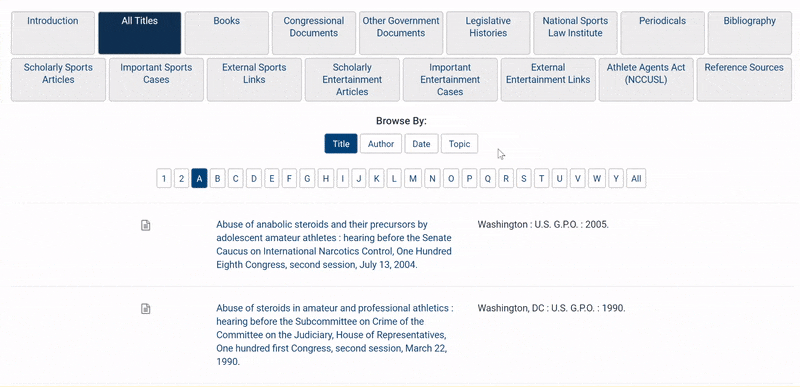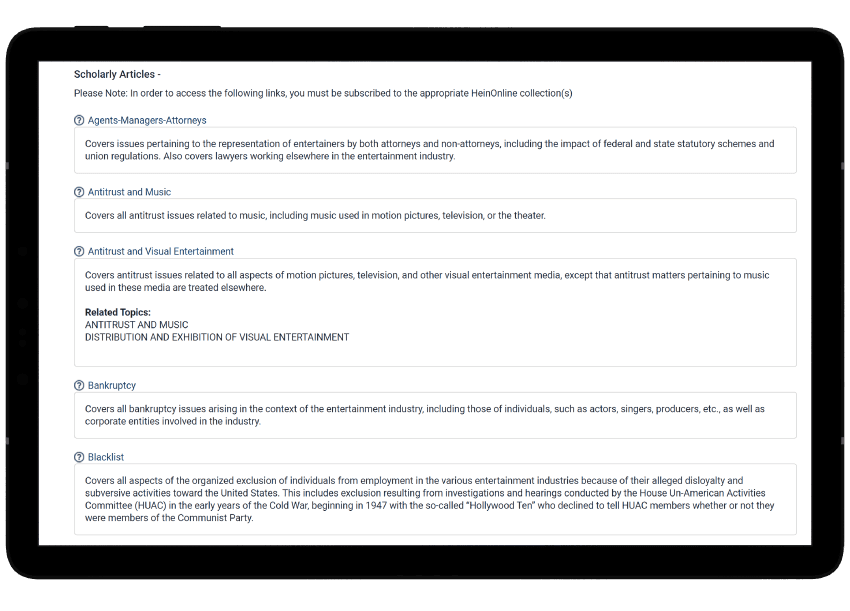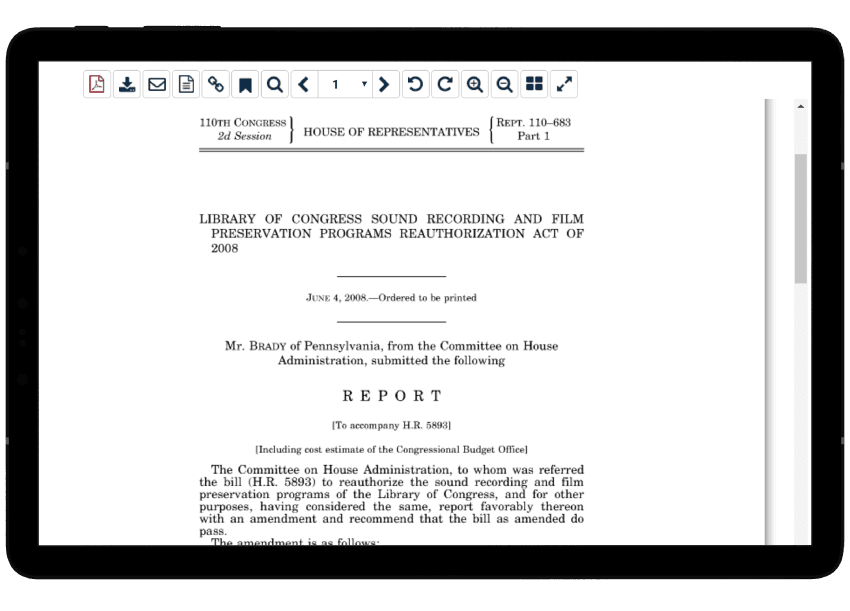WINNER OF THE 2020 JOSEPH L. ANDREWS LEGAL LITERATURE AWARD

Business and Legal Aspects of Sports and Entertainment
A comprehensive overview of sports and entertainment law, featuring thousands of topic-coded articles, hundreds of topic-coded cases, government documents, court decisions, and informative scope notes from the editor.
1,808
TITLES
4,315
VOLUMES
1,639,812
PAGES
Research Sports and Entertainment Law
Amateur and professional sports are a global, multi-billion dollar a year industry. The forces involved in generating that money naturally beget both social and legal implications that affect athletes, spectators, and even local taxpayers.
With a similar wide reach, each of us has purchased a movie ticket, cranked up the radio, binge-watched television shows, or streamed music. As technology changes how we interact with and consume various forms of entertainment (while also creating new ones), so too do the laws governing how that content is disseminated throughout our culture.
Whether we’re deeply invested in sports and entertainment or we claim to have no interest, the myriad manifestations of these two areas pervade our culture all the same.
About Business and Legal Aspects of Sports and Entertainment
HeinOnline’s Business and Legal Aspects of Sports and Entertainment (BLASE) aims to illuminate the critical issues prevalent in these two cultural arenas. The database builds upon HeinOnline’s historical strengths in legal periodical literature, case law, and U.S. federal and state materials by providing a unique topical arrangement for the documents within, while also adding many important resources not previously available in HeinOnline.
Thousands of editorialized and topic-coded scholarly articles, cases, and court decisions important to both sports and entertainment law are the highlight of this essential resource. Also included are full-text books and bibliographies with links to WorldCat holdings, legislative histories, House and Senate hearings and reports, committee prints, and reports from the Comptroller General, the Congressional Research Service, and the Government Accountability Office.
Title List: KBART (TXT) | CSV | HTML
Topic Coverage in the Database
The backbone of this database is the topical arrangement created by the editors after analyzing thousands of titles and scholarly articles. To help illuminate the editors’ approach when assigning material to topics and to define the reach and coverage of a particular topic, each topic listed under Scholarly Sports Articles and Cases and Scholarly Entertainment Articles and Cases is given a scope note. The scope note explains the focus of a given topic and, by extension, areas that a topic does not cover. Below is a list of these topics:
Entertainment Law topics
Covers issues pertaining to the representation of entertainers by both attorneys and non-attorneys, including the impact of federal and state statutory schemes and union regulations. Also covers lawyers working elsewhere in the entertainment industry.
Covers all antitrust issues related to music, including music used in motion pictures, television, or the theater.
Covers antitrust issues related to all aspects of motion pictures, television, and other visual entertainment media, except that antitrust matters pertaining to music used in these media are treated elsewhere.
Covers all bankruptcy issues arising in the context of the entertainment industry, including those of individuals, such as actors, singers, producers, etc., as well as corporate entities involved in the industry.
Covers all aspects of the organized exclusion of individuals from employment in the various entertainment industries because of their alleged disloyalty and subversive activities toward the United States. This includes exclusion resulting from investigations and hearings conducted by the House Un-American Activities Committee (HUAC) in the early years of the Cold War, beginning in 1947 with the so-called “Hollywood Ten” who declined to tell HUAC members whether or not they were members of the Communist Party.
Covers the regulation of the business and financial aspects of the cable and satellite television industries, including copyright-related issues. Treated elsewhere are materials addressing the content of cable and satellite television programming.
Covers issues relating to children and all aspects of entertainment, including but not limited to those involving children employed as performers. Also covers material analyzing the impact of entertainment media on children.
Covers issues relating to conversion of black-and-white films to color, particularly with the use of computerized programming techniques.
Covers all issues related to comedy and comedians in the context of the entertainment industry, including, but not limited to, stand-up comedy; comic routines and jokes; and comedy featured in films, television programs, and theater.
Covers issues relating to the regulation of the content of musical compositions, musical performances, or both. Includes censorship of lyrics on the basis of language (e.g., profanity) or topic (e.g., degradation of women, incitement to violence, drugs), and the use of rating systems to control concert attendance.
Covers issues relating to the regulation of the content of motion pictures, television, and other visual entertainment media, except that materials related to video games and reality television are covered elsewhere. Among topics covered are censorship, self-censorship and rating systems, violence, obscenity, adult motion picture theaters, and propaganda and political censorship.
Covers all issues pertaining to contracts utilized in the various fields of the entertainment industry, including motion pictures, television, theater, and music. Includes such topics as the extent to which an entertainment artist can be compelled to perform under a personal services contract, the use of morality clauses as the basis for terminating a talent contract, the use of 360 deals in the music industry, the validity of oral contracts, and the efficacy of profit-sharing agreements.
Covers copyright law, both federal and state, as it pertains to music and the music industry. Covered elsewhere is material related to duplication and distribution of music without the permission of the copyright owner; to copyright issues pertaining to digital sampling, digital and online music, and musical parodies; and music used in motion pictures, television, and the theater.
Covers copyright law, both federal and state, as it pertains to all aspects of theater, including such matters as the authorship of works, musical orchestrations, stage directions, makeup, and collaborative efforts.
Covers copyright law, both federal and state, as it pertains to motion pictures, television, and other visual entertainment except theater productions, cable and satellite television, and motion picture soundtracks, all of which are treated elsewhere. Also excluded from this topic is material related to duplicating and distributing visual entertainment without the permission of the copyright owner and the use of copyright to contest unauthorized changes in the content of visual entertainment materials, both of which are treated elsewhere.
Covers situations in which individuals or corporate entities in the entertainment industry become involved with the criminal justice system, including but not limited to criminal actions for copyright infringement by music or video pirates, for personal behavior such as domestic violence or sexual violence, and for corrupt behavior by industry participants. Also covers the use of music lyrics or videos as evidence of criminal activity.
Covers all issues pertaining to music that is stored and distributed in digital format, such as compact disc, MP3, or other compressed format, as opposed to using analog media in which the music is stored in physical form like magnetic tapes or vinyl records. Issues pertaining to digital sampling are treated elsewhere, as are materials that address how the emergence and prevalence of digital and online music has or will impact the music industry.
Covers all issues arising as the result of a disability, whether physical or mental, including, but not limited to, employment-related discrimination and accommodations required for disabled individuals attending an entertainment presentation such as a motion picture or music concert.
Covers all issues pertaining to the practices and methods used in the distribution and exhibition of motion pictures, television programs, and similar visual media, including but not limited to vertical integration in the film and television industries, blind bidding, and block booking. Treated elsewhere are materials pertaining to these issues in the context of theater productions and to disability-related issues arising in the venues used for exhibiting visual media.
Covers all matters arising in the production, distribution, and exhibition of documentaries (nonfiction films or television programs dealing with actual and factual issues, institutions, and people, with a goal of educating, informing, entertaining, or persuading) or docudramas (films, television programs, or theatrical productions that feature dramatized re-enactments of actual events). Treated elsewhere are materials about television programming which seeks to show ordinary people in what appears to be unscripted, real-life situations.
Covers employment-related matters that concern individuals, such as terms of employment, salary holdouts, and pension/retirement issues. Also covers claims of employment discrimination in the entertainment industry, including those involving race, gender, sexual preference, and sexual identity. Matters involving contracts are covered elsewhere, as are employment-related matters that are addressed collectively, typically through labor union-employer interactions.
Covers all issues pertaining to the practices and methods used in the financing and production of motion pictures, television programs, and other visual entertainment, including but not limited to profit participation agreements, foreign financing, advertising, government incentive plans, and independent productions. Treated elsewhere are materials pertaining to these issues in the context of theater productions.
Covers all matters involving motion pictures, television programs, and other visual entertainment from countries other than the United States, including issues related to their production, financing, distribution, and exhibition.
Covers all matters involving music created, produced, distributed, or performed in countries other than the United States.
Covers materials which focus on gender in the entertainment industry, except that those involving claims of inequality of employment opportunities because of gender are treated elsewhere. Other gender-related topics, such as discrimination because of sexual orientation and sexual harassment and violence are covered elsewhere, as is material that covers multiple types of discrimination, including gender.
Includes material which covers multiple aspects of entertainment law.
Covers employment-related matters that are addressed collectively, typically through labor union-employer interactions. These interactions may cover such topics as arbitration, collective bargaining, discipline, unions, working conditions, and compensation. Employment-related matters concerning individuals are covered elsewhere.
Includes materials which discuss how law, lawyers, and the legal system are portrayed in motion pictures and television programs.
Includes material pertaining to the intersection of entertainment with lesbian, gay, bisexual, transgender and queer individuals. Other issues, such as the inequality of opportunities available to women or sexual harassment and violence, are treated elsewhere.
Covers all matters arising from the employment of entertainers or an aspect of a work of entertainment to market goods or services, including but not limited to individuals involved in the entertainment industry or their name or likeness and to fictitious characters or events from a work of entertainment such as a motion picture, television program, or musical piece. Material examining the right of entertainers to commercially exploit their name, image, or likeness is covered elsewhere.
Covers material for which no other category is appropriate.
Covers materials examining issues related to the ability of creators of works of entertainment, including but not limited to films and musical compositions or performances, to control how their work is used in non-economic ways, typically respecting attribution and integrity, even if the economic rights to the work are held by someone other than the creator. Materials covering the protection of economic rights are covered elsewhere.
Covers legal and business issues related to music used in motion pictures and television programs, including but not limited to licensing songs for use in such works, film composing contracts, and copyrightability of movie soundtracks. Material dealing with copyright of music generally is treated elsewhere.
Includes material regarding music as a commercial enterprise, both as to individual musical artists and to the industry as a whole. Examples of topics included here are business models, music consumers and markets, revenue streams, income and costs, and distribution channels.
Includes all materials related to short films made for artistic or promotional purposes that feature the integration of a musical performance with imagery, often dancing and other images, that interpret the lyrics of the song.
Covers all issues arising from an entertainer’s use of parody to critically assess another author’s work, typically consisting of an exaggerated and humorous imitation of that work. Topics covered include but are not limited to copyright and fair use, trademarks, and First Amendment concerns.
Covers all issues pertaining to the use of patent law to protect intellectual property relating to any segment of the entertainment industry.
Includes materials regarding the illegal practice of bribing someone with money or some other inducement for the purpose of promoting a product. Most notably occurring In the music industry, it takes the form of a radio disc jockey playing a musical recording as if it is part of the normal day’s broadcast and not the result of a payment to the jockey.
Covers all aspects of the practice of illegally downloading, duplicating, or distributing visual or musical entertainment works, including motion pictures, television programs, video games, and sound recordings, without the permission of the copyright owner. Also includes releasing material not intended to be commercially produced and made available to the public without the permission of the copyright owner.
Covers all aspects of the practice in which the manufacturers of products pay for them to be featured in motion pictures or television programs in an effort to promote their sale. The practice of using entertainers to market goods or services is covered elsewhere.
Covers methods used to protect ideas related to all aspects of the entertainment industry, including ideas for motion picture and television program stories and for television program formats. Treated elsewhere is the use of copyright to protect expression and patents to protect inventions.
Covers materials which focus on matters of race in the entertainment industry, except that those involving claims of inequality of employment opportunities because of race are treated elsewhere. Material covering multiple types of discrimination, including racial, is also covered elsewhere.
Covers all issues arising in the production, distribution, and exhibition of the genre of television programming which seeks to show ordinary people in what appears to be unscripted, real-life situations, usually featuring unknown individuals rather than professional actors. Treated elsewhere are materials pertaining to nonfiction programs dealing with actual and factual issues, institutions, and people or programs featuring dramatized re-enactments of actual events.
Covers the right of individuals to commercially exploit their name, image, likeness, or distinctive personality aspect. Material related to issues arising from the employment of entertainers or a work of entertainment to market goods or services is covered elsewhere.
Covers all matters pertaining to individuals who write scripts for motion pictures, television programs, and other forms of visual entertainment, except the theater, which is treated elsewhere. Also treated elsewhere is material related to the protection of story ideas for films and television programs.
Covers harassment and violence of a sexual nature and domestic violence perpetuated against or by individuals involved in entertainment. Also covers institutional responses to and liability for such behavior.
Covers all aspects of social media use by entertainers or others associated with the entertainment industry.
Covers all issues related to spectators at entertainment venues, including injuries suffered while attending an event, ticketing problems such as scalping, and free speech and search and seizure issues. Treated elsewhere are issues pertaining to the needs of disabled individuals attending an entertainment presentation such as a motion picture or music concert.
Covers all aspects of taxation, whether individual, corporate, non-profit, or association, as it relates to entertainers or the entertainment industry.
Covers all aspects of the theater industry, except that materials regarding copyright and the theater are treated elsewhere, as are docudramas presented in the form of theatrical productions.
Covers all aspects of the use of both trademark law and unfair competition law to protect the economic, intellectual, and creative investments made by individuals or companies involved in the entertainment industry to distinguish themselves and their artistic works. In particular, this includes protecting against attempts to substitute goods or products for those of an individual or entity in the entertainment industry for the purpose of deceiving the public. Covered elsewhere are the practices of paying for products to be featured in motion pictures or television programs and using entertainers to market goods or services.
Covers all aspects of video gaming, including music used in video games.
Covers the disposition of property after death by intestate succession, will, or trust, as well as planning designed to prepare for the distribution and management of a person’s estate at death.
Covers workers’ compensation issues pertaining to entertainers and others employed in the entertainment industry.
- Antitrust and Theater
- Broadcasting
- Content Regulation
- Copyright
- Estate Planning
- Legal
- Motion Pictures
- Music
- Television
- Blacklist
- Copyright and Music
- Digital Sampling
- Employment Issues
- LGBTQ Issues
- Motion Picture and Television Music
- Piracy and Bootlegging
- Reality Television
- Sexual Harassment and Violence
- And Many More!
Sports Law topics
Covers issues pertaining to the representation of athletes by both attorneys and non-attorneys, including the impact of federal and state statutory schemes and union regulations. Also covers lawyers working elsewhere in the sports industry.
Covers the operation or results of a method for resolving disputes that does not involve litigation, such as conciliation, mediation, or arbitration. Topics covered elsewhere include collective bargaining related to the adoption of a new ADR mechanism to resolve labor-management or employment-related disputes, or the modification of an existing one, and the use of ADR in international athletics.
Covers antitrust in all sports, except baseball and intercollegiate athletics, which are covered separately.
Covers all antitrust issues related to baseball, whether amateur or professional. Material that covers antitrust issues in multiple sports, including baseball, is treated elsewhere.
Covers all antitrust issues related to intercollegiate athletics.
Covers all aspects of auto racing, whether amateur or professional, but not auto racing as a recreational sport or activity, which is covered elsewhere.
Covers all aspects of boxing, whether amateur or professional, but not boxing as a recreational sport or activity, which is covered elsewhere.
Covers all aspects of the broadcasting of amateur, college, and professional sports.
Includes: mixed martial arts, wrestling, fencing, savate, kickboxing, Tae Kwon Do, Brazilian Jiu-Jitsu, Judo, Karate, and K_d_ (formerly Karate). Materials covering boxing, whether professional or amateur, are treated elsewhere.
Covers those situations in which sport becomes involved with the criminal justice system, including but not limited to criminal actions for player-on-player violence during a competition, for spectator-on-spectator violence during or after a competition, for off-field behavior by players such as domestic violence, for physical mistreatment of sports officials, and for corrupt behavior by sport administrators.
Covers all aspects of competitive cycling, whether amateur or professional, as well as cycling as a recreational sport or activity.
Covers discrimination and other issues related to all types of disabilities, both physical and mental (including learning disabilities), in both amateur and professional sports. Material covering multiple types of discrimination, including disability, is covered elsewhere.
Covers articles that discuss discrimination generally or more than one type of discrimination. Discrimination involving disabilities, gender, or race covered in separate topics.
Covers use of, restrictions on, and other issues related to both illegal recreational/street drugs and performance-enhancing substances. Issues related to drugs used for medical purposes are covered elsewhere.
Covers employment-related matters that concern individuals, such as player or coaching contracts, terms of employment, salary holdouts, and pension/retirement issues. Employment-related matters that are addressed collectively, typically through labor union-employer interactions, are covered elsewhere, as are provisions or policies that establish restraints on player freedom.
Covers all aspects of endorsement contracts and sponsorships involving athletes, athletic teams, and others involved in sports.
Covers all aspects of competitive video gaming at a professional level. Fantasy sports are covered elsewhere.
Covers all aspects of online gaming where participants assemble imaginary or virtual teams of real players of a professional sport and compete based on statistical performance of those players in actual games. Includes gambling on such activities. Competitive video gaming on a professional level are covered elsewhere.
Covers issues involving restrictions or special treatment placed on an athlete playing in a “foreign” country based on birthplace or nationality, including the regulation of immigration and free movement of individuals.
Covers issues pertaining to the movement of an existing professional sports franchise to a different geographic location, particularly challenges, often through antitrust claims, to such movement. Related topics treated elsewhere include the financing of arenas and stadiums, and the creation, expansion, contraction, or elimination of leagues.
Covers wagering of all types, both legal and illegal, on all sporting events except that gambling related to fantasy sports is covered elsewhere. Includes use of the Internet for sports wagering.
Focuses on the inequality of opportunities available to women in both amateur and professional sports. Also covers matters pertaining to the fluidity of gender definition in athletic competitions, including gender classification and testing. Other gender-related topics, such as discrimination because of sexual orientation and sexual harassment and violence are covered elsewhere, as is material that covers multiple types of discrimination, including gender.
Includes material which covers multiple aspects of sports law generally or multiple aspects of a single sport not otherwise covered.
Covers all aspects of competitive golf, whether amateur or professional, as well as golf as a recreational sport or activity.
Covers all aspects of competitive horse racing, whether amateur or professional, but not equine activity engaged in as recreation, which is covered elsewhere.
The right of publicity is covered elsewhere.
Covers all aspects of intercollegiate athletics, including rights of student athletes, rights and obligations of coaches, and NCAA enforcement procedures. The following topics are covered elsewhere: antitrust; broadcasting; discrimination based on gender, race, or disability; drugs and doping; and sexual harassment and violence.
Covers issues related to international sports, particularly with respect to governance and dispute resolution. Among the institutions included within this topic is the Court of Arbitration for Sport (CAS). Topics covered elsewhere include the regulation of performance enhancing substances in international competitions, athletes who compete in countries other than their own, and matters pertaining to the Olympic Games.
Covers all aspects of interscholastic athletics except matters involving drugs and doping or sexual harassment and violence, both of which are covered elsewhere.
Covers employment-related matters that are addressed collectively, typically through labor union-employer interactions. These interactions may cover such topics as collective bargaining, discipline, unions, playing conditions, player compensation, and the establishment of a new alternative dispute resolution procedure or the modification of an existing one. Covered elsewhere are employment-related matters concerning individuals, provisions or policies that establish restraints on player freedom, and the operation or results of an existing mechanism, such as mediation or arbitration, for resolving disputes that does not involve litigation.
Covers formation and elimination of leagues; changes in league structure, including both expansion and contraction.
Includes material pertaining to the intersection of sports with lesbian, gay, bisexual, transgender and queer individuals. Other issues, such as the inequality of opportunities available to women in sport, the fluidity of gender definition in athletic competitions, and sexual harassment and violence are treated elsewhere.
Includes: health/medical data; HIV/AIDS; sickle cell, heart, and other issues used to exclude individuals from competition.
Covers material for which no other category is appropriate.
Covers various issues impacting Native Americans, including controversies over the use of tribal names, images, and mascots to represent sports teams, whether amateur or professional.
Covers all aspects of the Olympic Games, both Summer and Winter, and the Paralympic Games.
Covers provisions or policies designed to limit player freedoms, such as reserve and option clauses, player drafts, and eligibility rules, and responses to such provisions or policies, such as free agency. Employment-related matters concerning individuals are covered elsewhere, as are such matters that are addressed collectively, typically through labor union-employer interactions.
Covers discrimination and other issues related to race, in both amateur and professional sports. For intercollegiate athletics, includes academic eligibility rules challenged on basis of racial discrimination/bias (e.g., Cureton v. NCAA, Proposition 16). Material about Native American issues, including challenges to use of tribal names and imagery, is covered elsewhere. Material covering multiple types of discrimination, including racial, is also covered elsewhere.
Covers all issues related to physical sporting activities where the primary purpose is participation, with the related goals of improved physical fitness, fun, and social involvement often prominent, rather than competition. Distinguished from competitive sports, whether amateur or professional, which involve not only contests, but also take as a central tenet that the athlete or team will continually seek progress and advancement to a higher level. Included in this category are activities sometimes termed “extreme sports” (e.g., motocross, mountaineering, base jumping, snowboarding) which often are physically hazardous because they involve combination of speed, height, danger, stunts, and varying weather conditions.
Covers the right of individuals to commercially exploit their name, image, likeness, or distinctive personality aspect.
Covers harassment and violence of a sexual nature and domestic violence perpetuated against or by individuals involved in sports at all levels–youth, amateur, professional–including athletes, coaches, trainers, and physicians. Also covers institutional responses to and liability for such behavior.
Covers all aspects of competitive soccer, whether amateur or professional, but not as a recreational sport.
Covers all aspects of social media use by athletes, whether professional or amateur, including Olympic, professional, collegiate, or scholastic.
Covers injuries to spectators at competitive sports events. Other issues related to spectators are covered elsewhere.
Covers all issues related to spectators, except for injuries suffered while attending sporting events, which are covered elsewhere. Includes ticket scalping, personal seat licenses and other ticketing issues, free speech and search and seizure issues.
Covers various issues related to sports stadiums, arenas, and other facilities, including financing for their construction or renovation, particularly the use of public resources; eminent domain actions; personal seat licenses; and naming rights.
Covers topics related to the oversight and regulation of professional leagues by commissioners and other entities, and the oversight and regulation of intercollegiate athletics by national associations. The regulation and oversight of interscholastic and international athletics are treated elsewhere.
Covers injuries to participants in competitive sports, both amateur and professional, including concussions. Recreational and spectator injuries are covered elsewhere, as are medical issues such as HIV/AIDS, sickle cell, and heart problems that may be used to exclude individuals from competition.
Covers all aspects of medical care of athletes by physicians, including malpractice or liability for harmful diagnosis or treatment.
Covers all issues pertaining to officials who control the actual play of a competition (e.g., umpire, referee, or judge) and administer the rules and laws of the sport to ensure the proper conduct of a sporting event.
Covers all aspects of taxation, whether individual, corporate, non-profit, or association, including the “Jock Tax,” incentives granted to professional franchises, personal seat licenses, college and university donations, prizes and awards, and discriminatory tax treatment of non-residents or international athletes.
Covers all aspects of the ownership and financing of professional team franchises, including the use of revenue sharing, salary caps, luxury taxes, and bankruptcy protection. Also covers the employment of public funds, taxpayer support, or both for the benefit of a professional team, except when used for stadium and arena financing, which is treated elsewhere. Also treated elsewhere is material related to franchise relocation.
Covers all aspects of competitive tennis, whether amateur or professional, but not tennis as a recreational sport or activity, which is covered elsewhere.
Covers workers’ compensation issues for both employers and amateur and professional athletes, including differential treatment by certain states of athletes and non-athletes for injuries sustained in competition.
Covers all aspects of competitive yacht racing, whether amateur or professional, but not as a recreational sport.
Covers all aspects of sports events where the competitors are younger than adult age, whether children or adolescents. Includes both school sport, at either the primary or secondary level, as well as sport played outside the education system, whether informally or organized (e.g., Little League baseball, Pop Warner football).
- Baseball
- Football
- Legal
- Television
- Auto Racing
- Broadcasting
- Drugs and Doping
- Fantasy Sports
- Gambling
- LGBQT Issues
- Olympics
- Religion and Sport
- Sports Injuries and Violence
- And Many More!
Database Tools and Features
Topic-Coded Articles and Cases
Every title in this database has been assigned its own sports or entertainment-related topic, organizing the content and allowing for easy access.


Editorialized Scope Notes and Annotations
The editors have provided scope notes for each of their topics, illuminating their approach when categorizing material, while also providing annotations to complement important cases and decisions.
Extensive Government Documents
Find more than 1.3 million pages of federal and state documents, including legislative histories, House and Senate hearings and reports, committee prints, and reports from the Comptroller General, the Congressional Research Service, and the Government Accountability Office.

Related Books and Periodicals
Locate entire books and periodicals throughout HeinOnline that are dedicated to topics within the purview of sports and entertainment. Content here is not segregated by sports or entertainment as many of these titles address both subjects.
National Sports Law Institute
Discover conference proceedings, books, and periodicals from the National Sports Law Institute (NSLI), a leading research institute for the study of legal, ethical, and business issues in both amateur and professional sports.
Athlete Agents Acts (NCCUSL)
Find meeting materials, drafts, agendas, memoranda, final acts, and more from the committee related to the Uniform Athlete Agents Act, model legislation that addresses statutory concerns regarding agents and athletes.
About the Joseph L. Andrews Legal Literature Award
Business and Legal Aspects of Sports and Entertainment has been named the winner of the 2020 Joseph L. Andrews Legal Literature Award. This award recognizes a significant textual contribution to legal literature. The textual work may be a book, pamphlet, periodical contribution, website, database, or publication in some other format. Nominations for the Andrews Award shall be measured by the creative, evaluative elements and the extent to which originality and judgment were factors in the formation of the work. The term ‘legal literature’ is meant to be broadly defined, and includes works that: 1) are bibliographical in nature, listing the works of a particular author, printer, or country, or a particular theme; or 2) contribute to the body of legal literature and that also contribute to advancing legal research or law librarianship.
About the Editors

Frank G. Houdek holds B.A., J.D., and M.L.S. degrees from the University of California. Houdek has previously served as a librarian at Lawler, Felix, and Hall (an LA law firm), Associate Director of the Law Library and Adjunct Assistant Professor of Law at USC Law Center, and Law Library Director and Professor of Law at Southern Illinois University. Most recently, Houdek served as the Associate Dean for Academic Affairs at Southern Illinois University School of Law until he retired in 2014.

Ed Edmonds holds A.B., M.L.S., and J.D. degrees from the University of Notre Dame, the University of Maryland, and the University of Toledo, respectively. He previously served as the law library director at the Marshall-Wythe School of Law at William & Mary, the Loyola University New Orleans School of Law, and the Law Library of the University of St. Thomas School of Law in Minneapolis. Edmonds has served as the director of the Kresge Law Library at Notre Dame from 2006 until his retirement in 2016.
